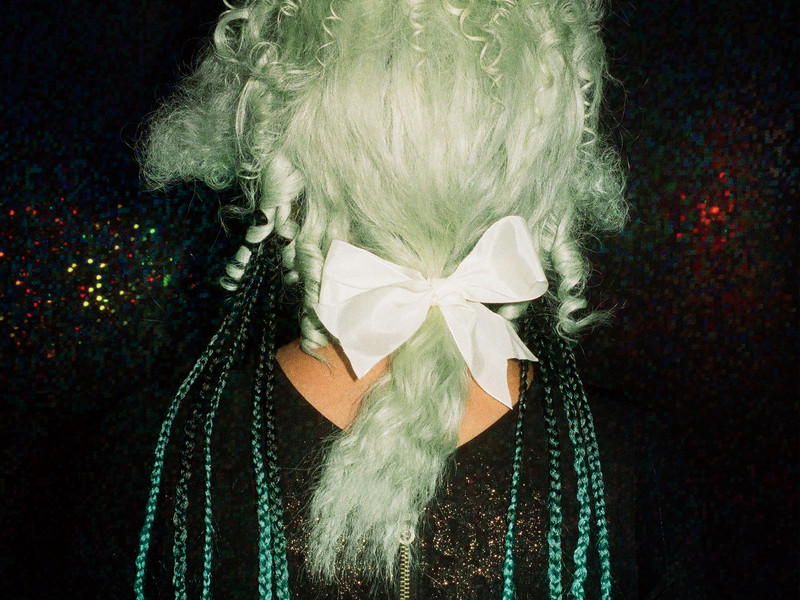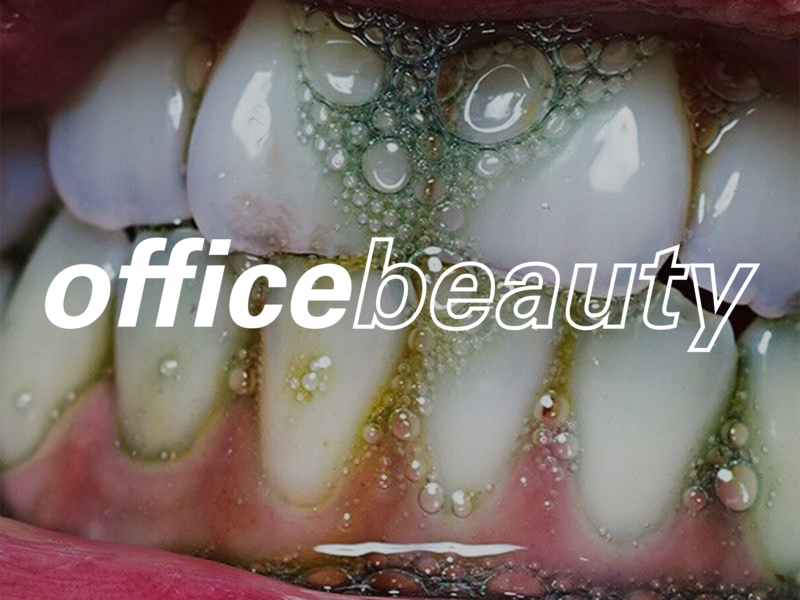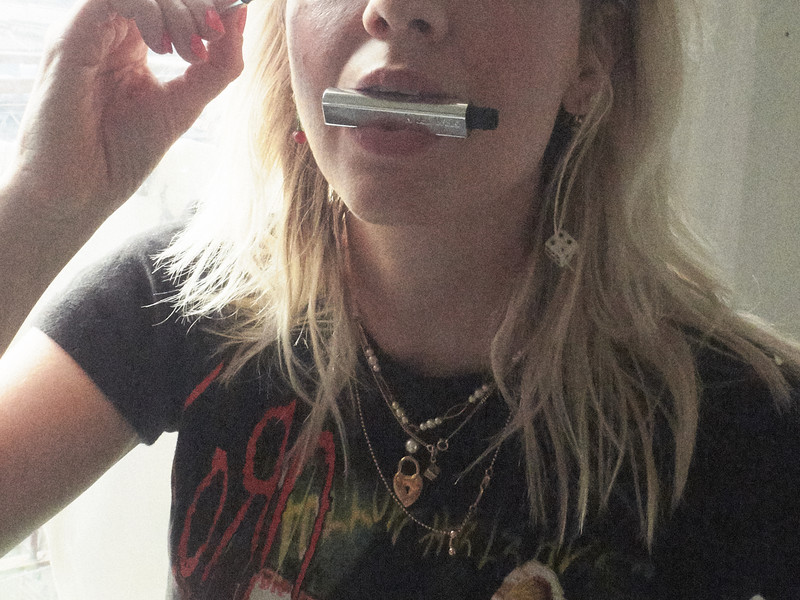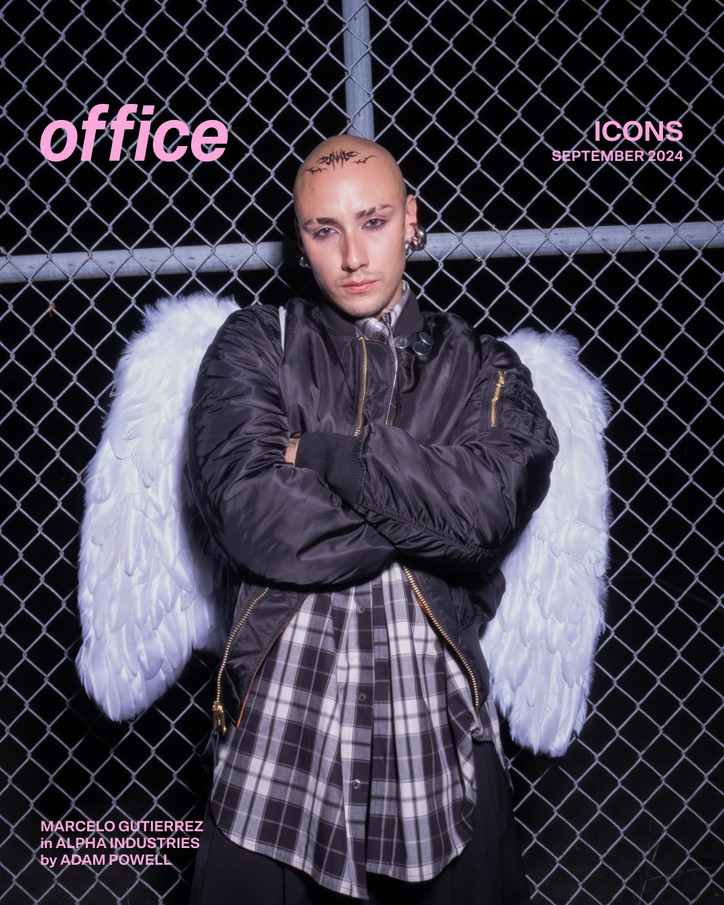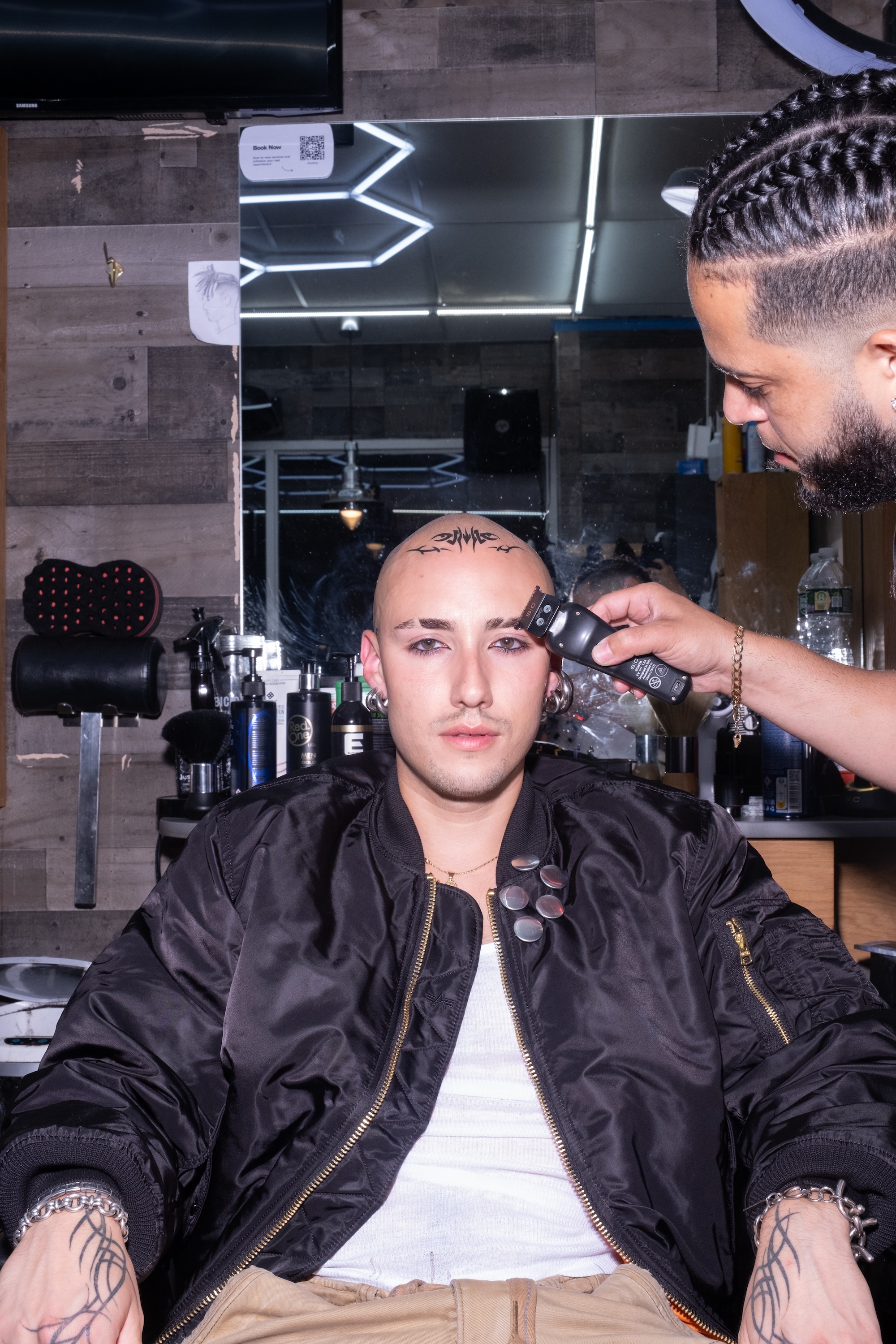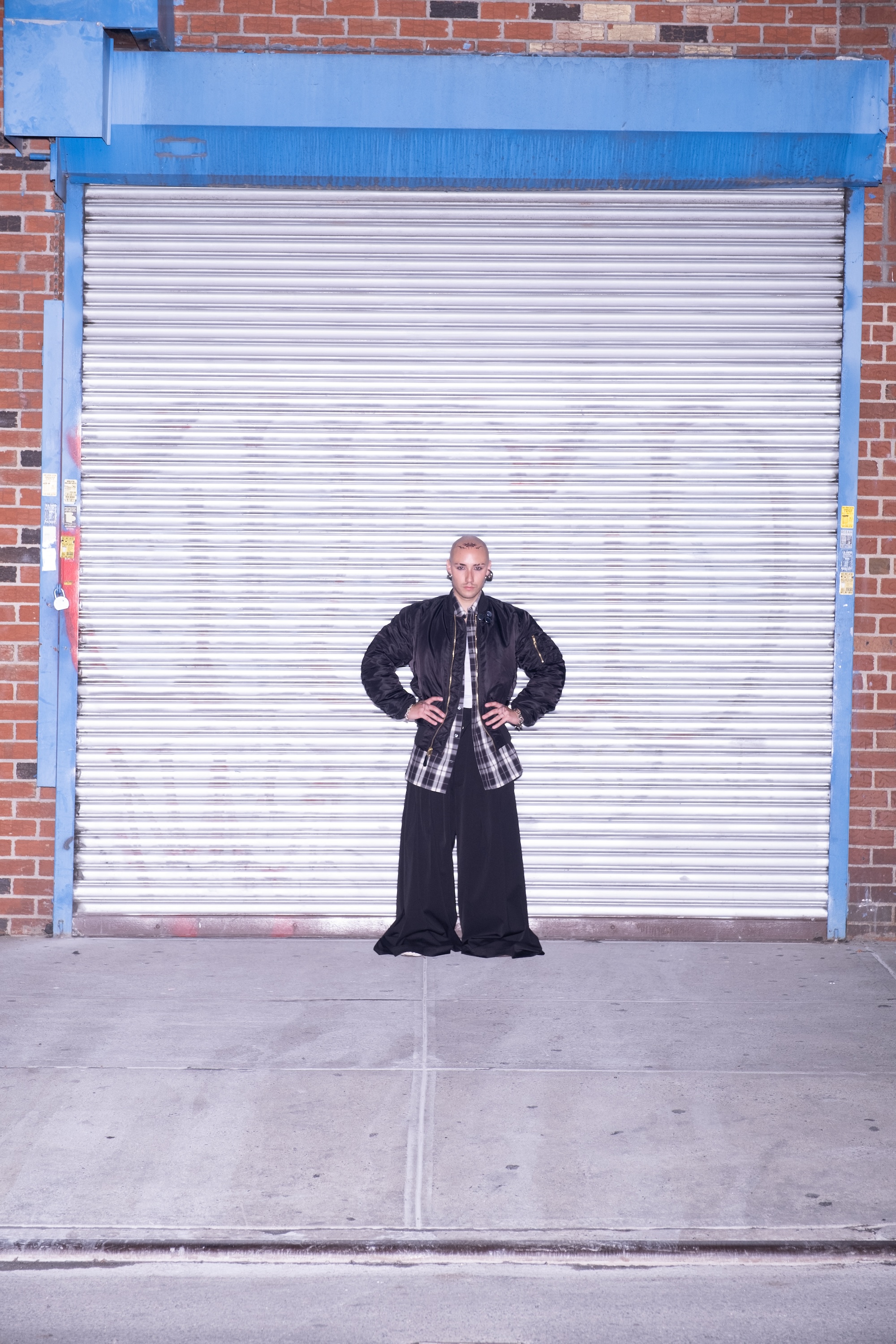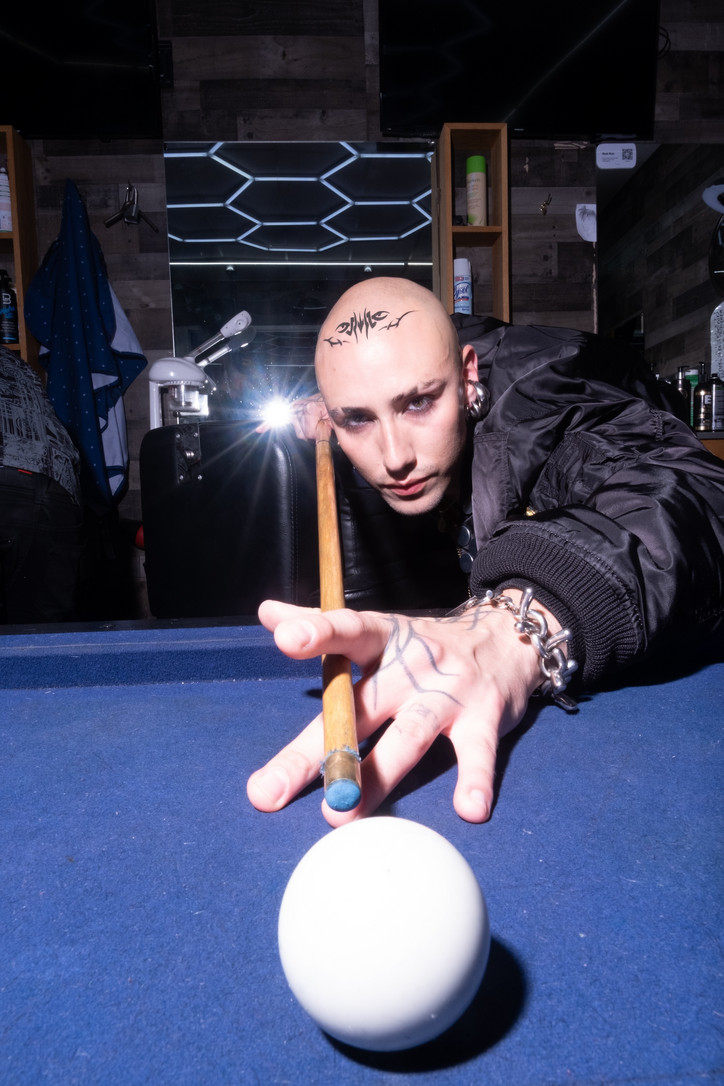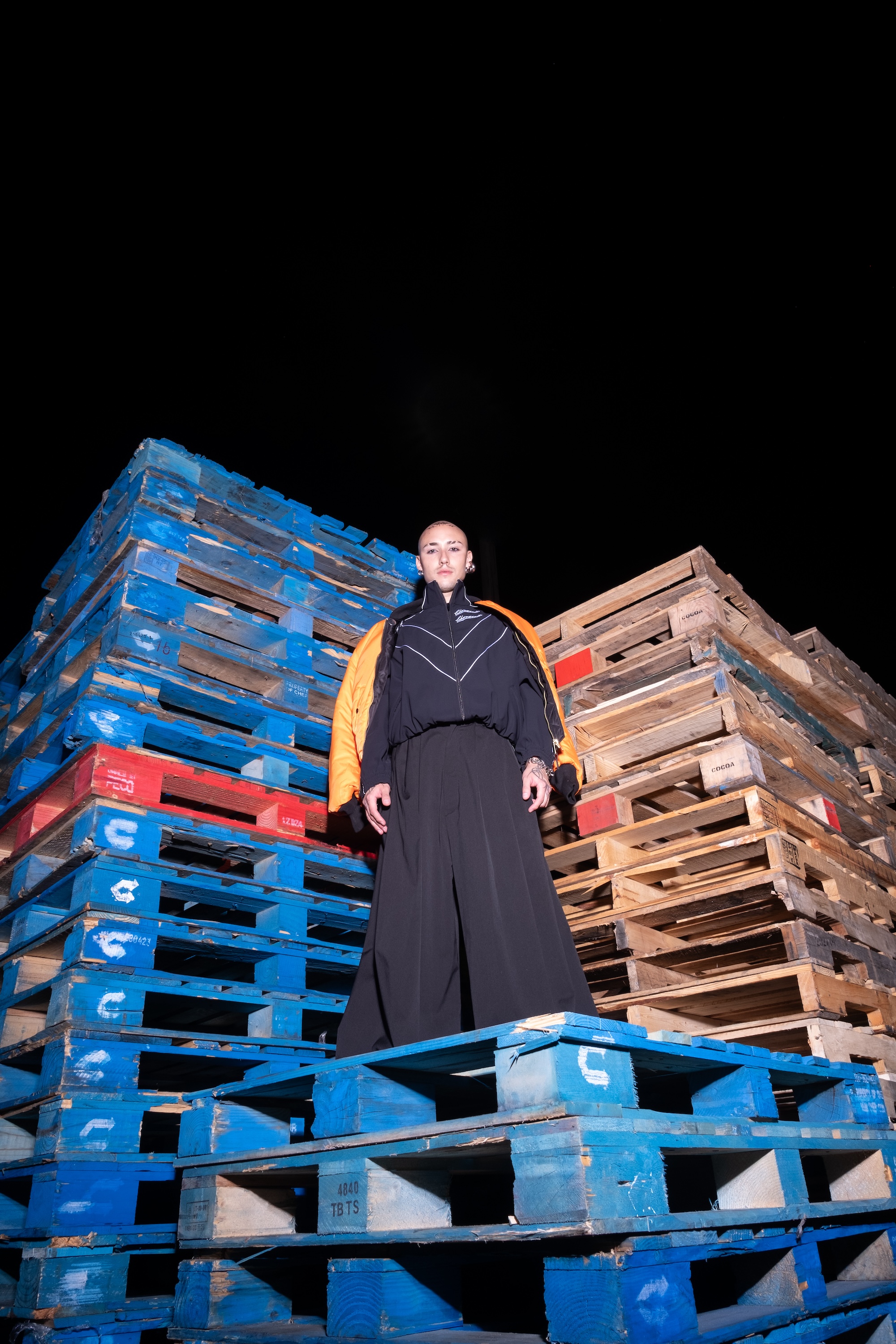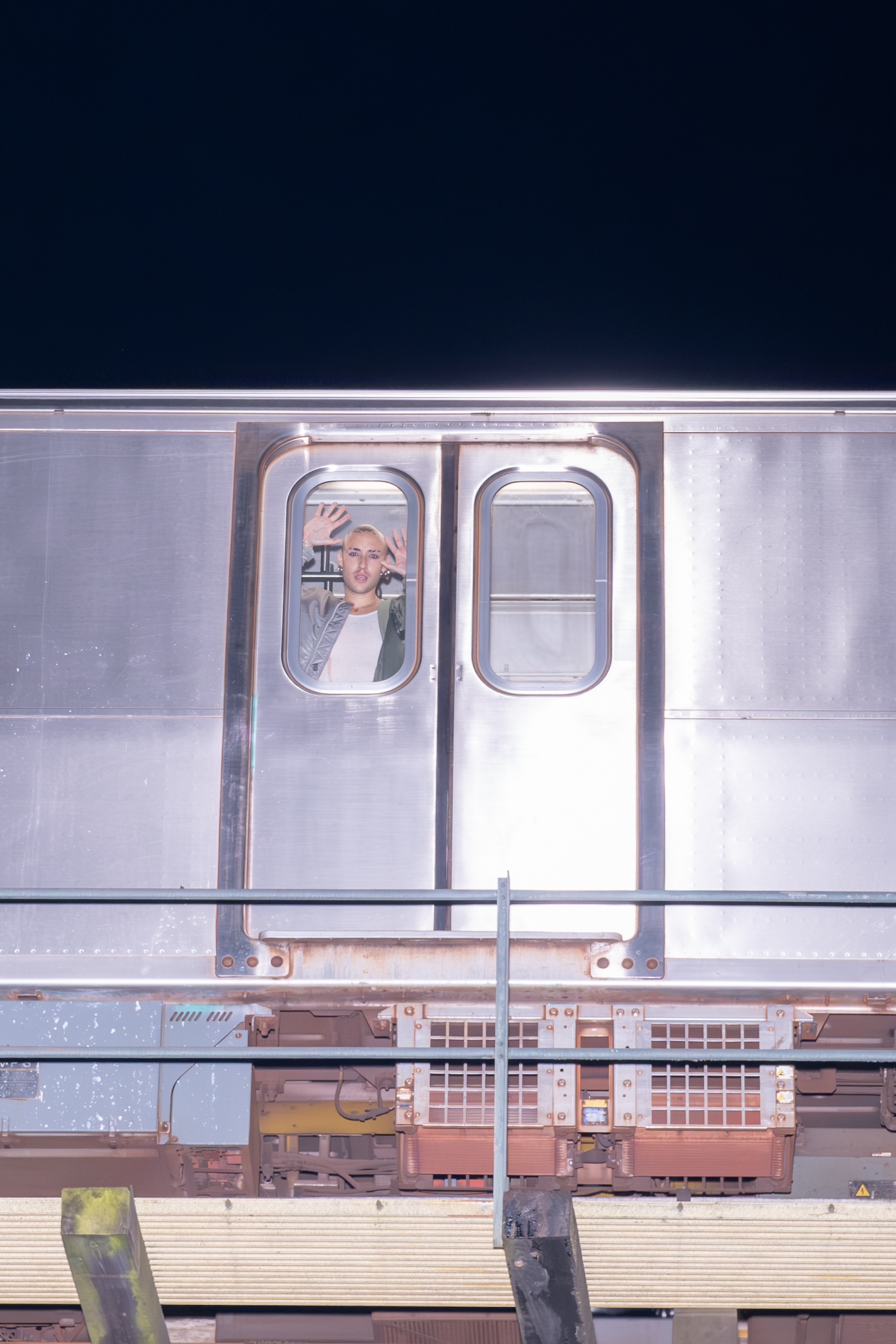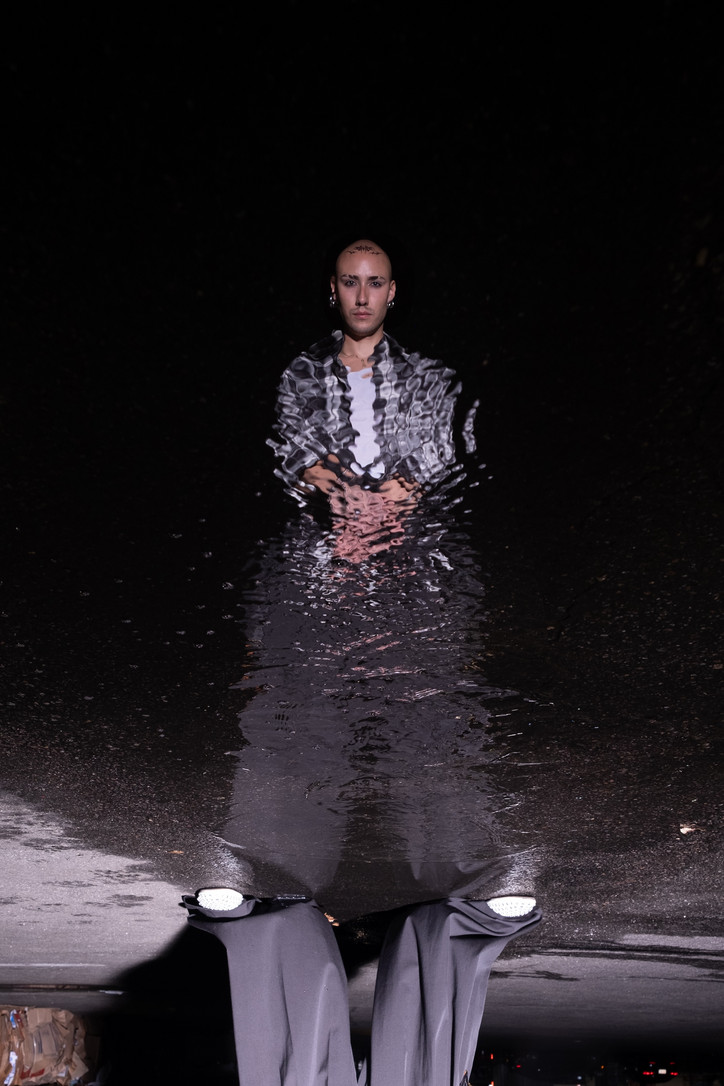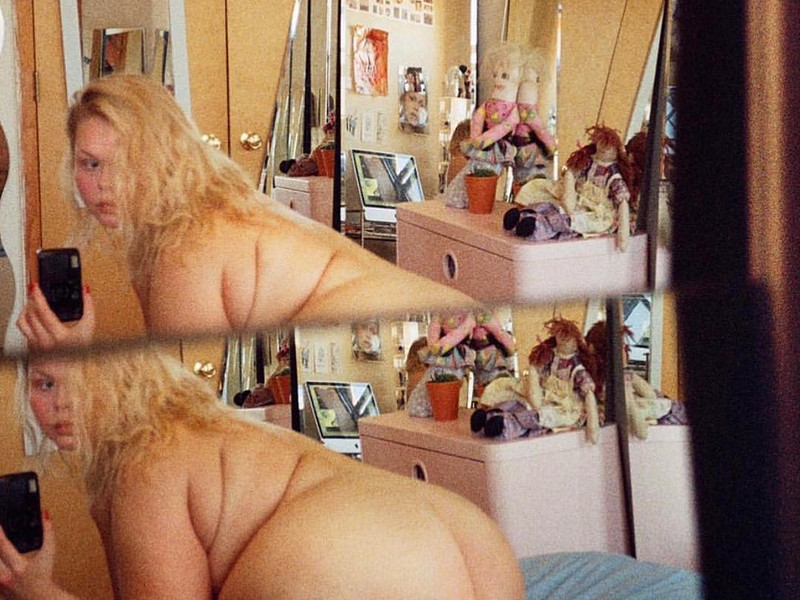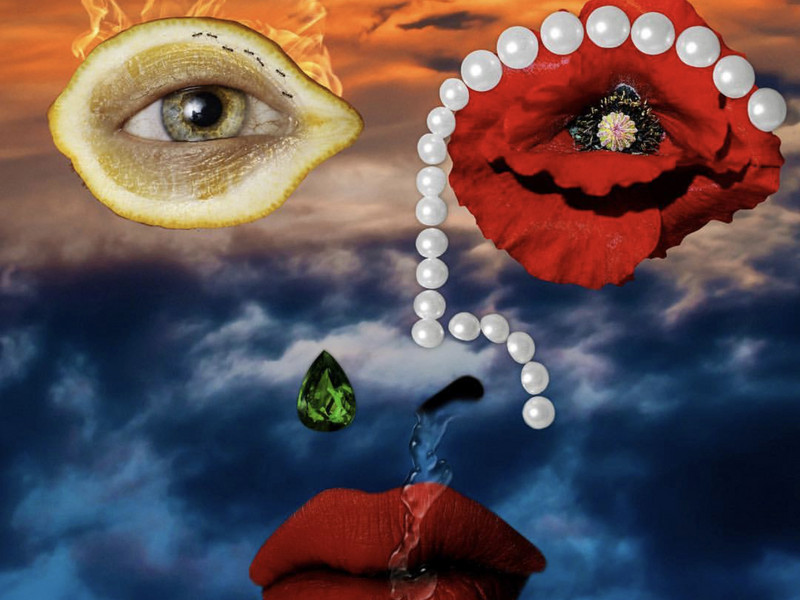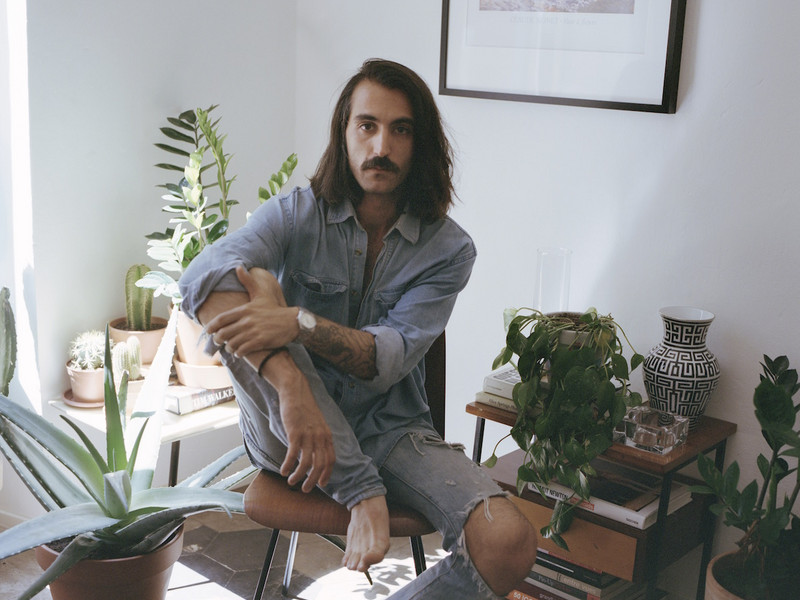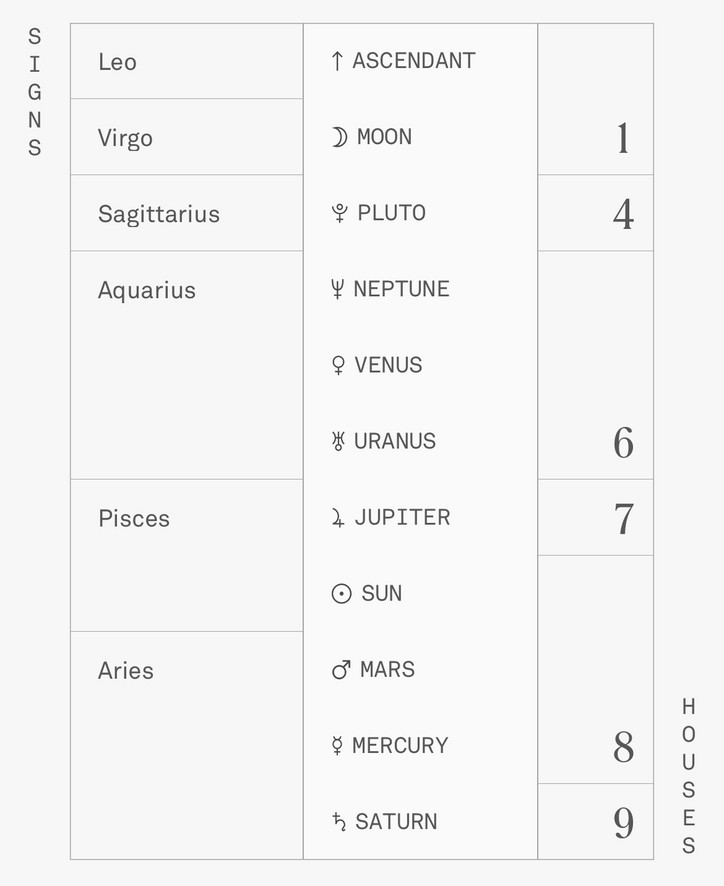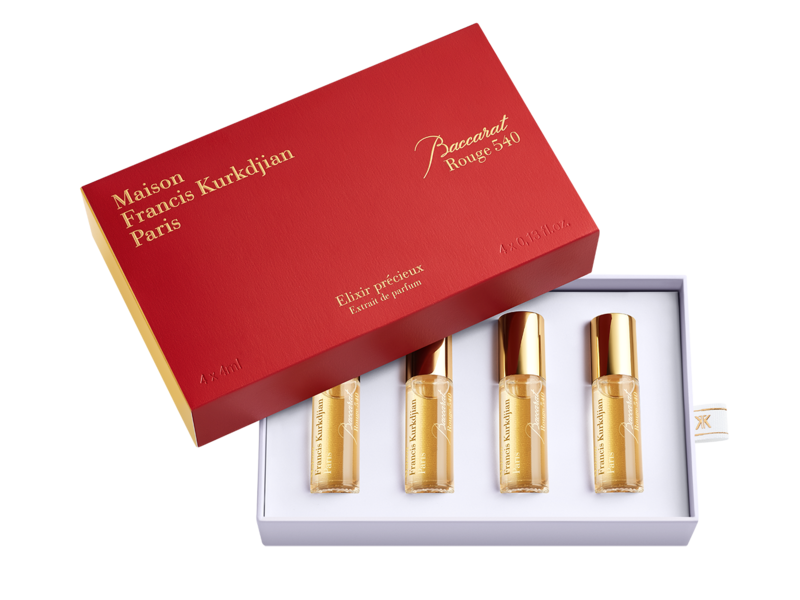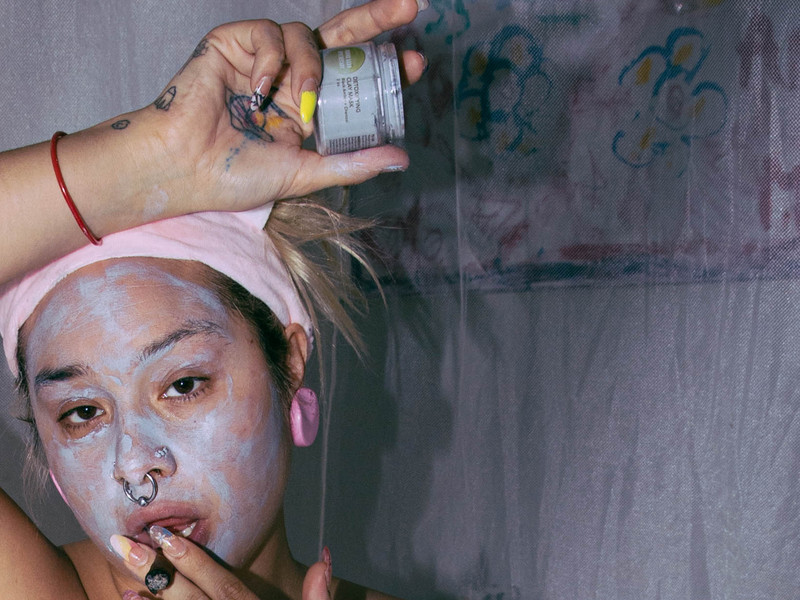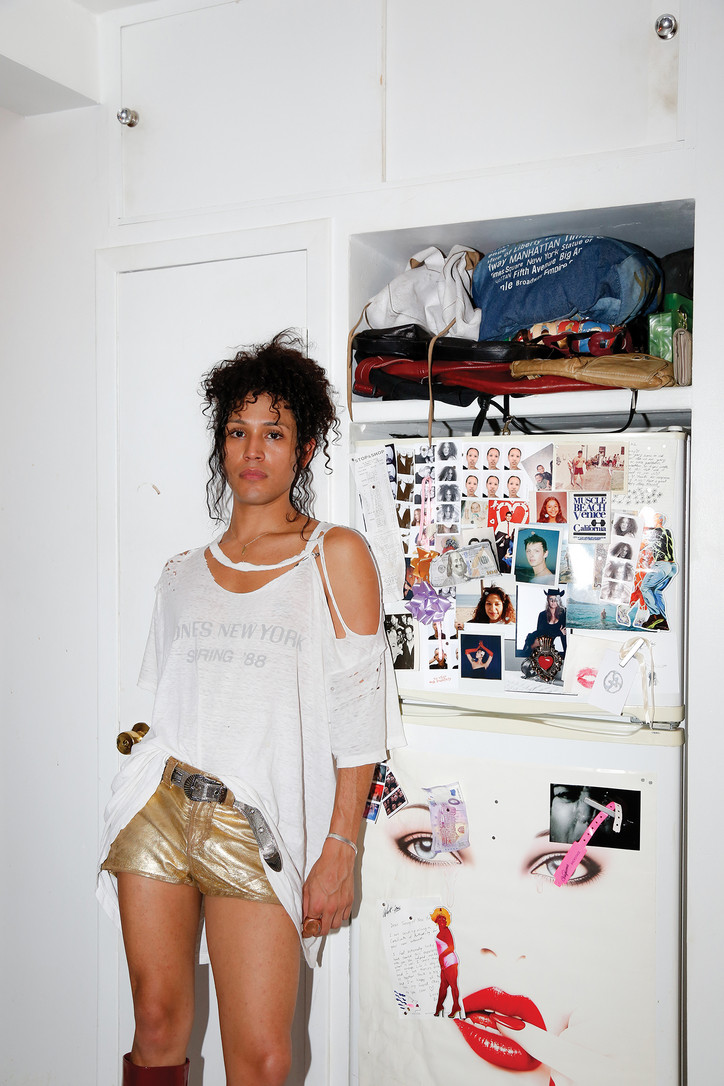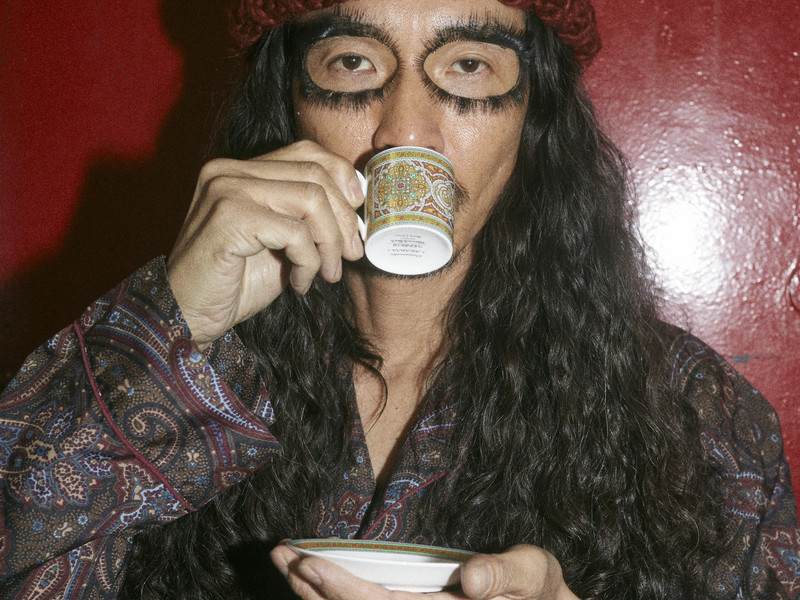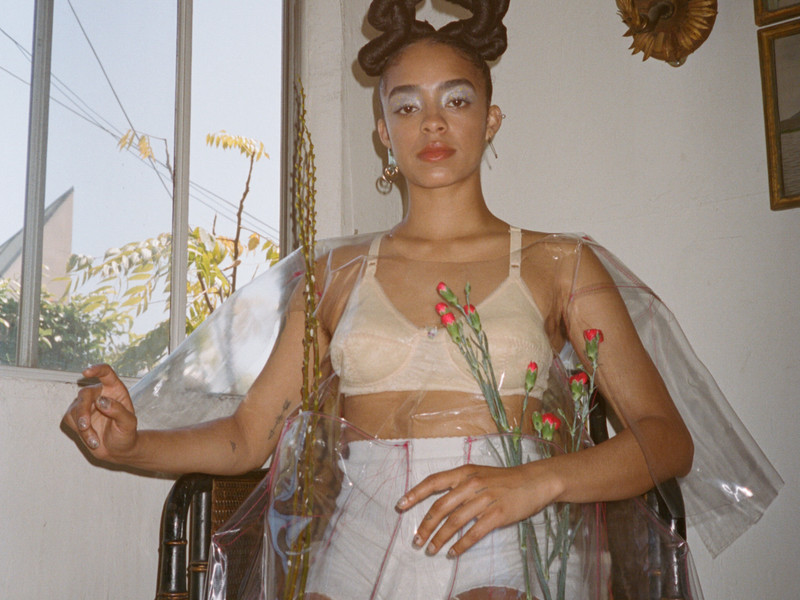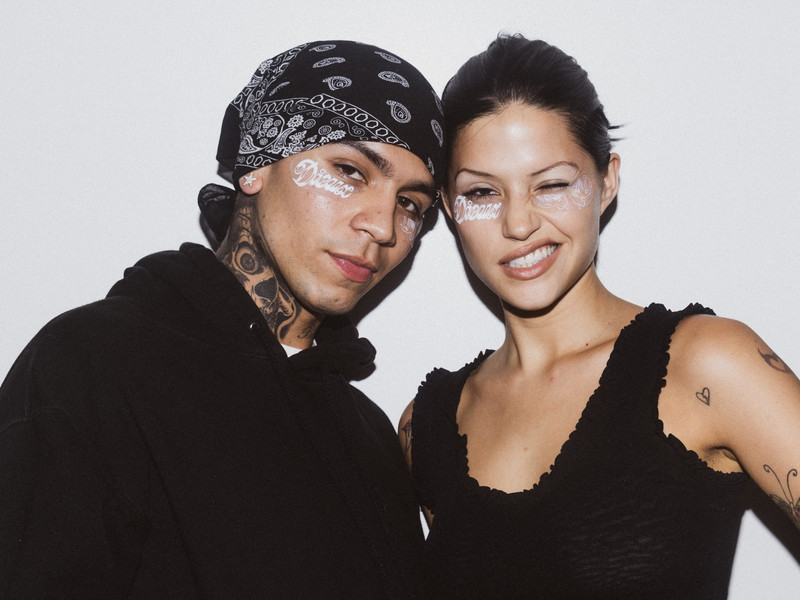The Anti-Rachel
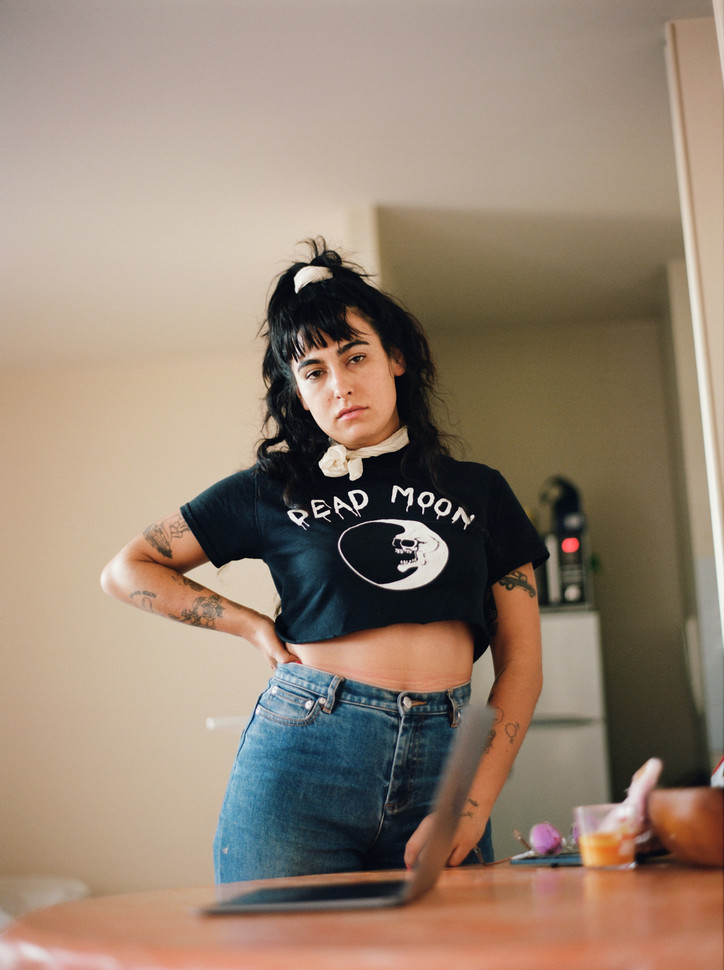
Take the mullet, for example—a look Chavles popularized after she began posting photos of the shaggy cuts she gave herself and her friends. But after seeing it on the cover of fashion magazines, and in the Instagram captions of a random fashion blogger, “I have to find something else to do,” she says.
Just think of the hair stylist’s cuts like The Anti-Rachel.
“It’s about embracing your look and being okay with yourself,” says Chavles. “I just don’t like people who want to look safe, or refuse to take any risks. And for me, I want to grow and experiment," she adds. "I never want to get stuck doing the same fucking thing.”
office caught up with the hair stylist before she headed to Paris Fashion Week to talk about hating beachy waves and the unwavering power of hair.
You recently styled the Vaquera show during NYFW. Tell me about the vision you had for the hair. How did you execute your idea?
I’ve worked with Emma Wyman a few times, and she called me and said, ‘We’re doing this thing and it’s supposed to feel kind of like high school.’ But I didn’t want it to feel obvious. I wanted it to feel insecure—like right before your punk, or right before your goth, or right before you find out what your niche is in your teen years. So, I wanted it to feel like that moment when you’re trying to figure yourself out, and figure out what speaks to you, and you kind of have a grip on it, but you’re also not totally sure yet, which I think is a really stressful, testy, but fun time to be alive. I think we all went through something like that—where you are not totally dedicated to it but you’re almost there. I just wanted to make sure I didn’t go ‘90s. So, some of the hair was also super inspired by that really crappy, MySpace, hardcore music scene that had such a specific underground vibe.
Do you always have that detailed kind of story when you style a show?
I try to—I think it’s important. Even if the hair is super technical, I like to have a reason and figure out who that person is before. As much as I like working technical looks, I believe everyone can learn how to work in that way. But I think it’s important to work emotionally, as well—that’s the kind of thing that makes it fun, instead of trying some crazy look that no one understands except for the hairdresser. Having something that can make everyone feel a certain way is really important.
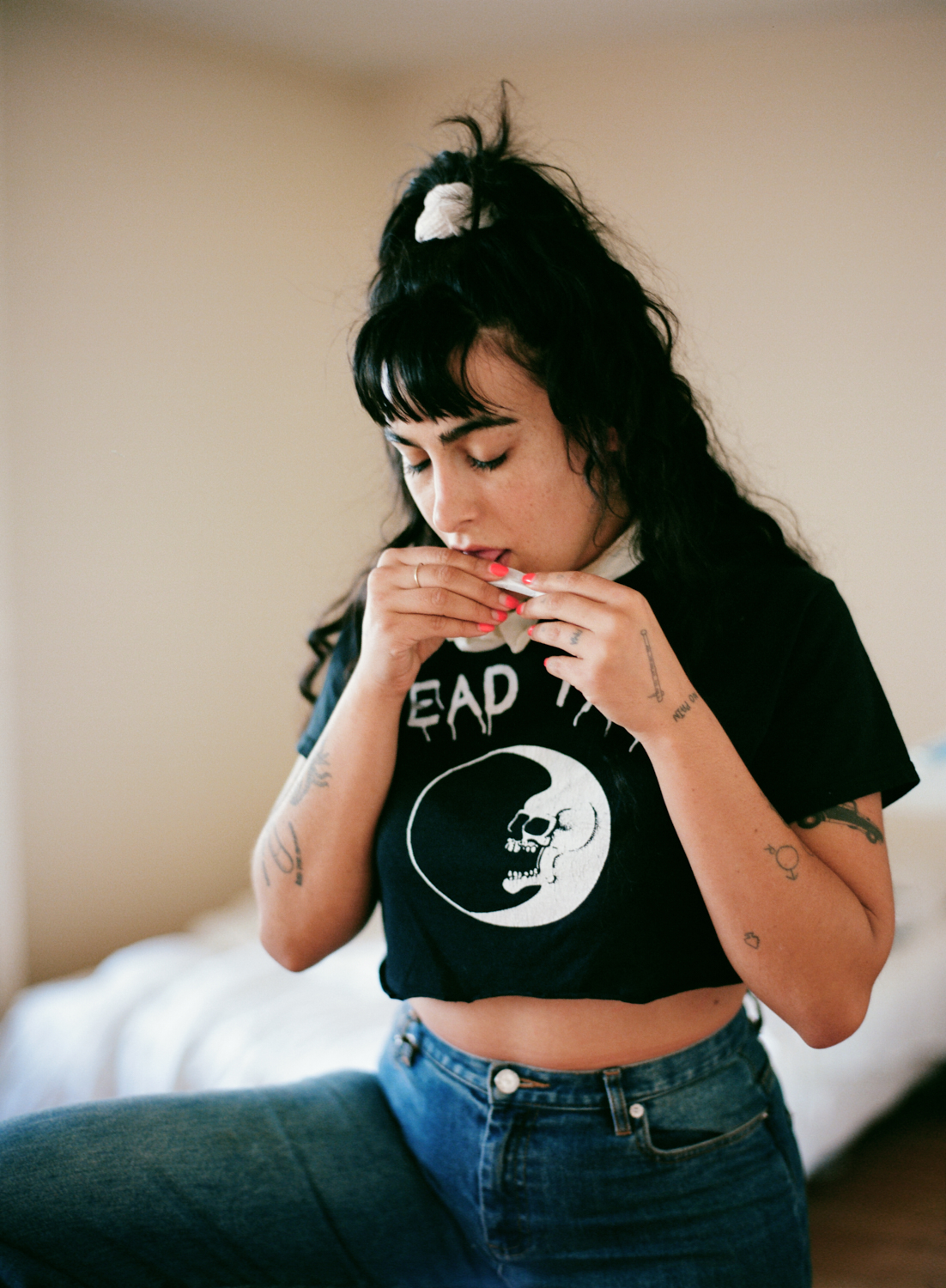
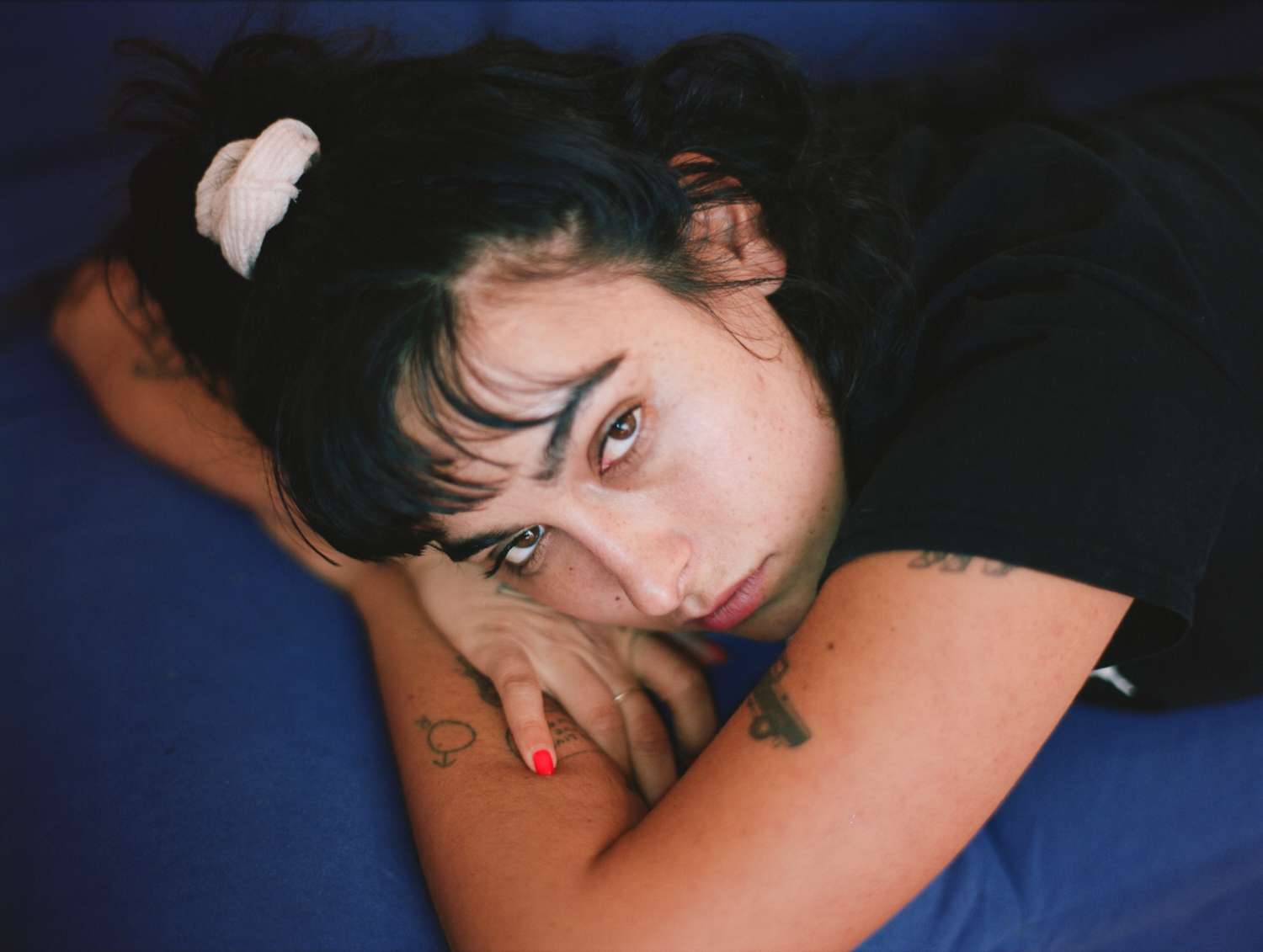
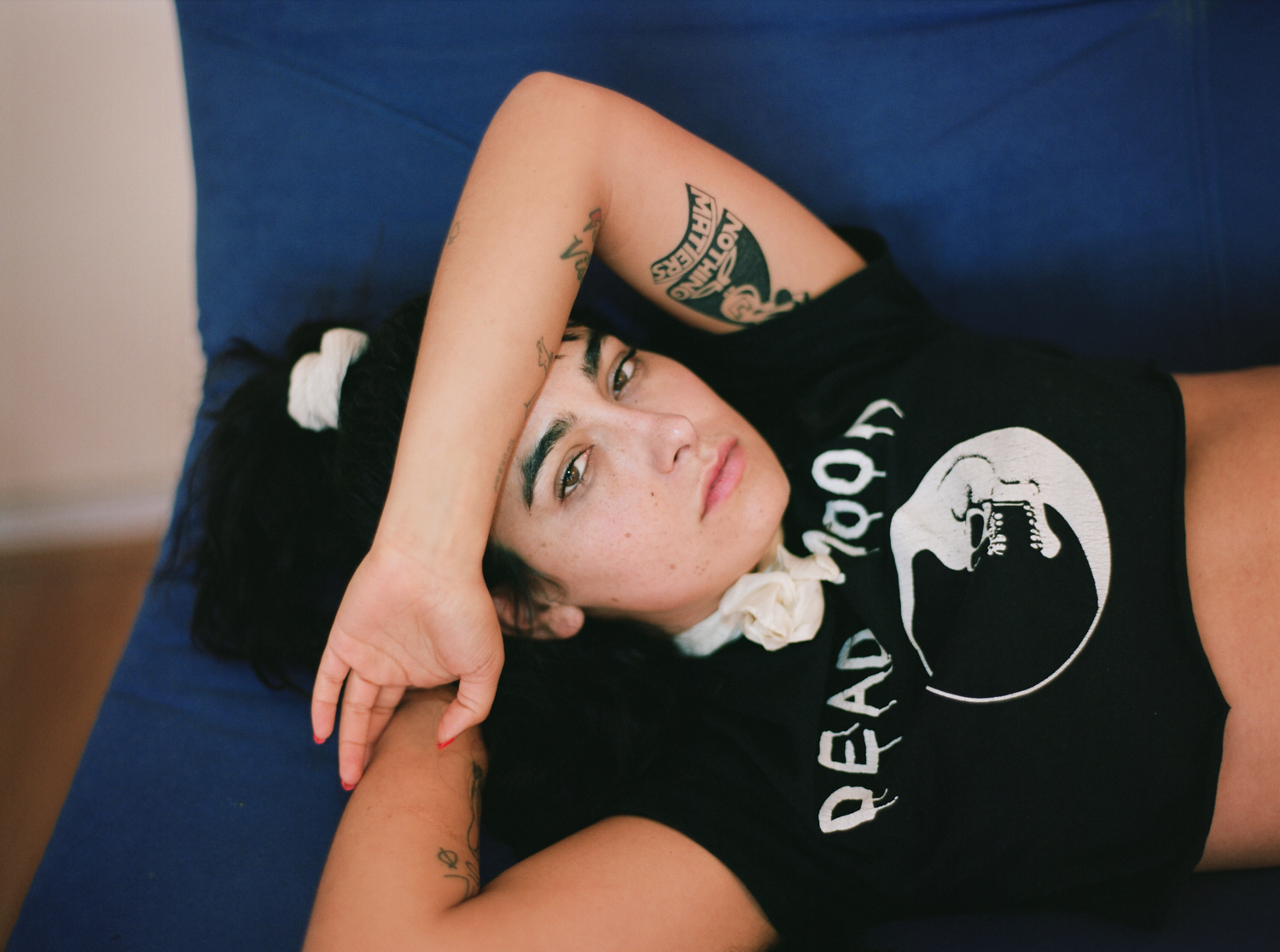
Vaquera has obviously been pretty outspoken about their political beliefs in the past, when it comes to their collections. Do you think hair can be political on its own?
I think it is. There’s actually something that I am working on now, where I’ve been interviewing radical people and trying to figure out a way to mush beauty and being radical, or being active, together. They often seem like really separate things, and hair can seem like something that isn’t important, but I don’t think either is true. For me, I can definitely, for the most part, look at somebody and based on their hair figure out if we will get along or not. It sounds weird, but there are certain haircuts, and certain colors, and ways of wearing your hair that are radical.
Also, being okay with what your texture is, is a really radical statement in itself, especially if you grew up with curlier hair. Like me—I’m Greek and Jewish, so I have a beard, and lots of thick, dark, curly hair that’s really considered unmanageable, and unprofessional. Even more so for black women, too. I mean, adhering to white beauty standards doesn’t make you more professional, or richer, or smarter, or better. In cities, those kind of differences are more acceptable, but for people wearing their hair naturally outside of cities, in a lot of ways, makes it harder for them to, for example, get a job. If you want to be hired, you have to look like a clean, white lady—you have to always think of the public eye and commercialize yourself.
You said you could tell by someone’s hairstyle if you would get along with them. So, what’s a hairstyle that makes you want to be best friends with someone? What’s a hairstyle that makes you think someone is lame?
I basically get along with anyone who doesn’t have beachy waves. Beachy waves, for me—especially because I do live in LA most of them time—are a boner killer. That look just bums me out. Like, this weird concept of what you think is normal. But it’s just boring, everyone wants to look the fucking same—like someone from Instagram. Literally, if someone comes to me and says they want the beachy waves, I won’t do it. I tell them they should find someone else because that’s just not my style.
But also, the most annoying thing about beachy waves is that it’s advertised as looking natural, but no one’s hair looks like that ever! So, it sucks when I meet girls who are like, ‘I want this picture with natural waves,’ and I’m just like, ‘That’s not natural, that’s a blow dry, and then they put a flatiron through it, then a curling iron, and used about $200 worth of product.’ It just creates this horrible idea of what hair is supposed to be, which takes us back to our conversation about hair being political. It’s manufactured. So, don’t beat yourself up because your hair doesn’t look like that when you get out of the shower. When did that fucking happen?
Well, if you think about it: in the ‘80s, everything was so huge and unnatural. Then, in the ‘90s, it went back to more natural, so-called normal hair. So, you have all of these people who want to be on trend, and they see grunge in fashion magazines, and try to recreate what they think is naturally messy, but then it’s totally stylized.
Right, but it’s a slightly stylized messy for people who already have straight hair. So, there is no beachy, effortlessly natural messy hair for anybody who doesn’t have pretty straight hair. And if you have a lot of hair, like me, it doesn’t work for you either. But it’s not like I’m not going to be a bitch about it and say, ‘I don’t like your hair we can’t hang out.’
When we’re talking about beauty, I think hair has the most ability to be radical just by being itself—having short hair, or naturally curly hair when it’s supposed to be straight. So, I think what you do is really interesting because you work with what people already have. I mean, I know when I was younger, I wish I had a hairstylist who didn’t always make it look like they had styled my hair—it just didn’t make me feel like myself.
Yeah, it’s about being okay with yourself, which sounds like an easy thing to do, but it’s fucking hard. I mean, we have mirrors in front of us, we have the most beautiful people in the world on magazine covers that make you feel like, ‘What? Wow, I don’t look like that, I guess I’m just trash.’ I don’t care how much you’ve worked on yourself, or how much self-esteem you have, or how much you love yourself—it’s fucking difficult. And then things turn into a trend! Like now, certain body shapes are trendy–that’s just so weird to me.
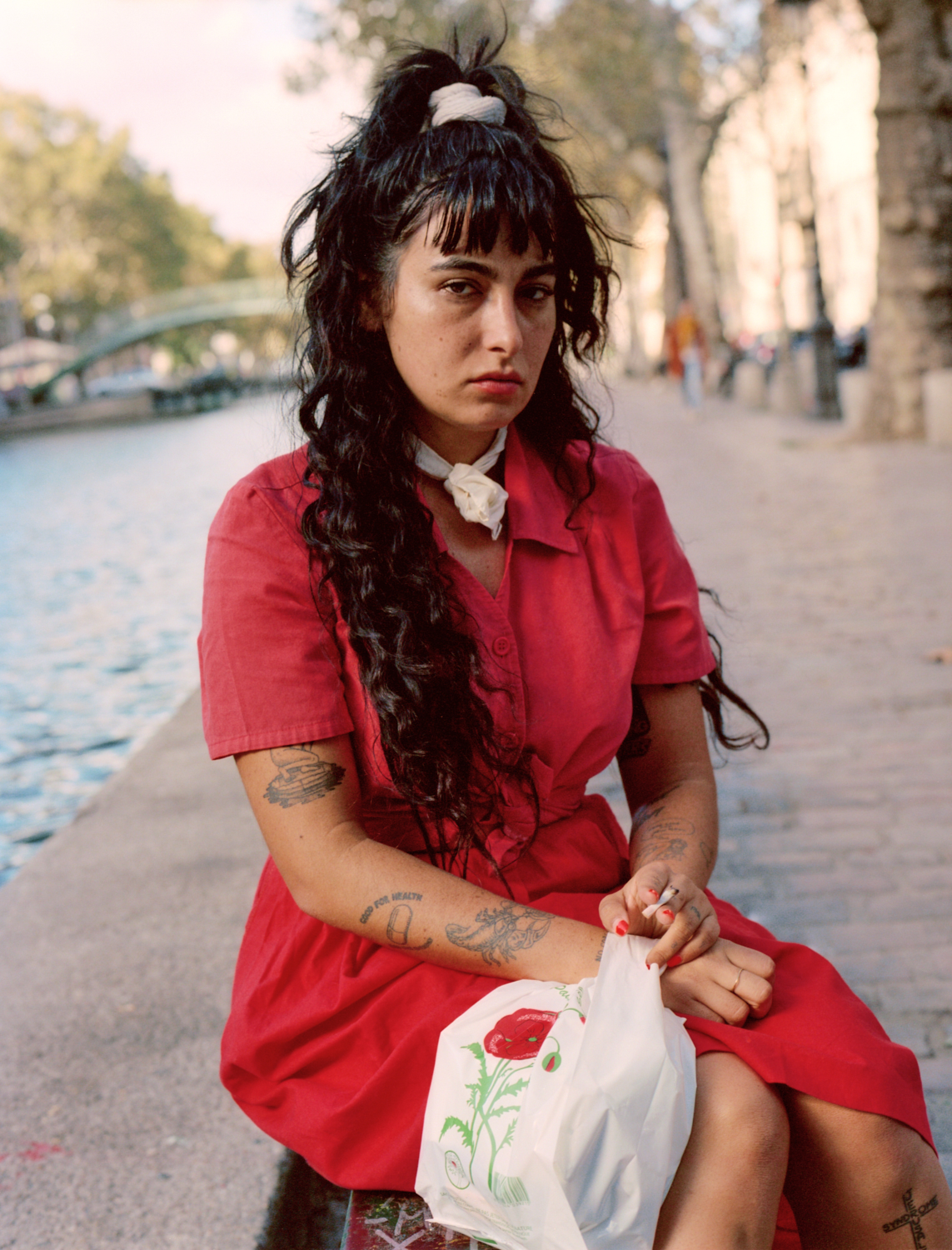
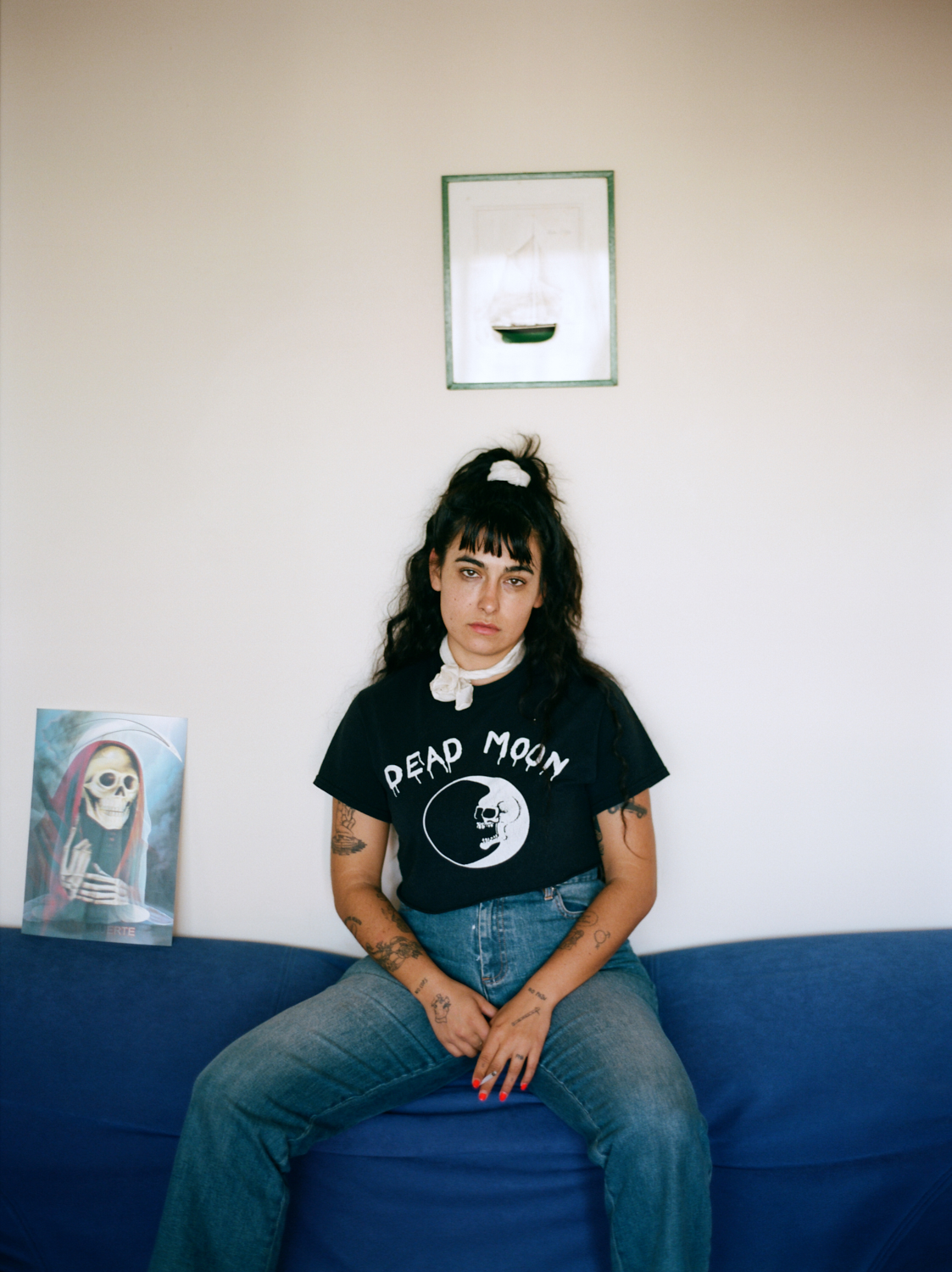
Right, as fashion has gotten ‘inclusive,’ it’s made it so more sizes are accepted. But then it’s like, only certain types of 'big' become acceptable.
Yeah. So, now the Kardashian body is socially acceptable, but that’s a body that most black and brown women have always had, that’s now become fetishized and turned into this cool thing. I remember reading an article about one of the first fitness models with a big butt, and it said, ‘Big butts are in now,’ and I was just like, ‘Are you kidding me? I have had a big ass my whole life.’ I mean, I’m glad that these things are now starting to be accepted, but it’s also super annoying that things I’ve struggled with my whole life are now suddenly being appreciated by the American public. It’s just a really weird thing to me.
Hair has that power, too. I mean, think about The Rachel.
Exactly, and those haircuts made those hairdressers famous. Sally Hershberger has the empire she does because she did the Meg Ryan haircut. Or Michael Canale because of Jennifer Aniston’s highlights. So, haircuts definitely have a serious power.
What is today’s Rachel? Or rather, what do you wish it were?
I wish there was no Rachel. I mean, a lot of people come to me to get a mullet, and people with curly hair who want bangs but are scared to cut their hair because it’s curly—I have a lot of them, too, which is awesome. But I don’t want everyone to look the exact same. Just recently, I saw some random fashion blogger posting about how she wants to get a fashion mullet. So, now that I’m starting to see them around, I want to move away from it. Of course, it’s cool that something that’s not conventionally beautiful is becoming popular, but now it’s my time to move on and figure out something cool and new. So, maybe a really odd Japanese teen haircut will be my next thing. Or more people with big, puffy hair, or short, weird geometric cuts with weird shapes.
What made you want go into hairstyling to begin with?
I was the person in high school who could do hair. I grew up bleaching everyone’s hair in my bathroom and giving everyone these weird little haircuts, and got them ready for prom. Hair was just kind of like, my weird thing that I was capable of. Then I tried to go to college, but dropped out. So, I was broke, living in San Francisco when I was 17, and one day I passed by a hair school and thought, ‘Why not try this?’ Eventually, I went back to LA and went to school, then trained under Benjamin Mohapi for four years. He’s basically my dad, and one of my best friends. But so, I went to school and worked my ass off, sixteen hours a day, seven days a week, eating shit and learning everything. But it paid off—and I can do basically anything, because I have classic training.
I’ve noticed younger hairdressers now, especially on social media, who want to be good—but they don’t really want to be good, they want to be popular. So, they don’t want to go through actually learning how to doing something, because it’s difficult. But I think no matter what you do, you just have to learn how to do it—I mean, you can’t just fuck around and be a shitty carpenter, then you would really mess up someone’s house. The same thing goes for hairdressing, or plumbing, or any other kind of hands-on work—you need a lot of experience. You need to keep practicing and do it all the time, and learn from someone who is really good.
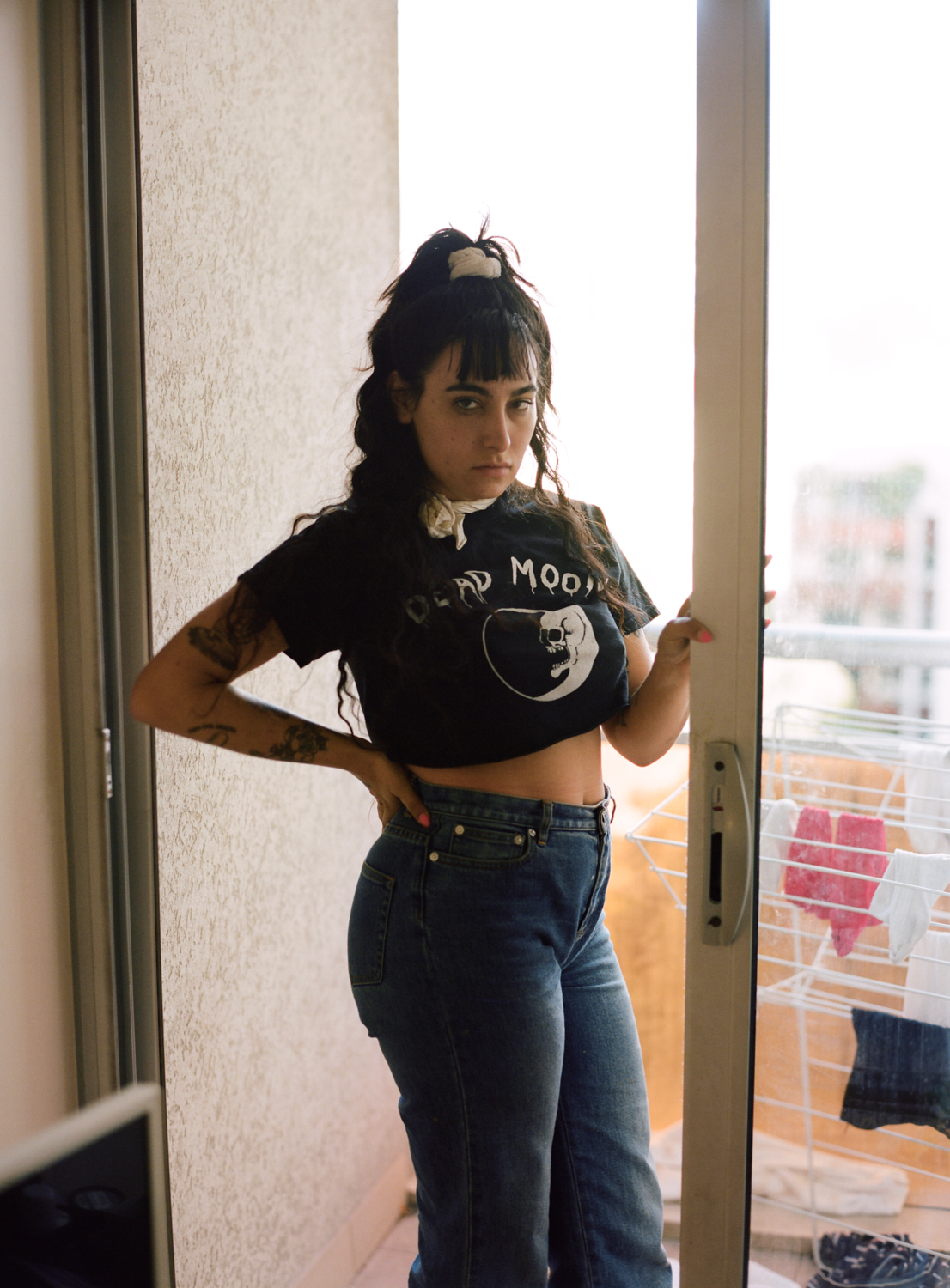
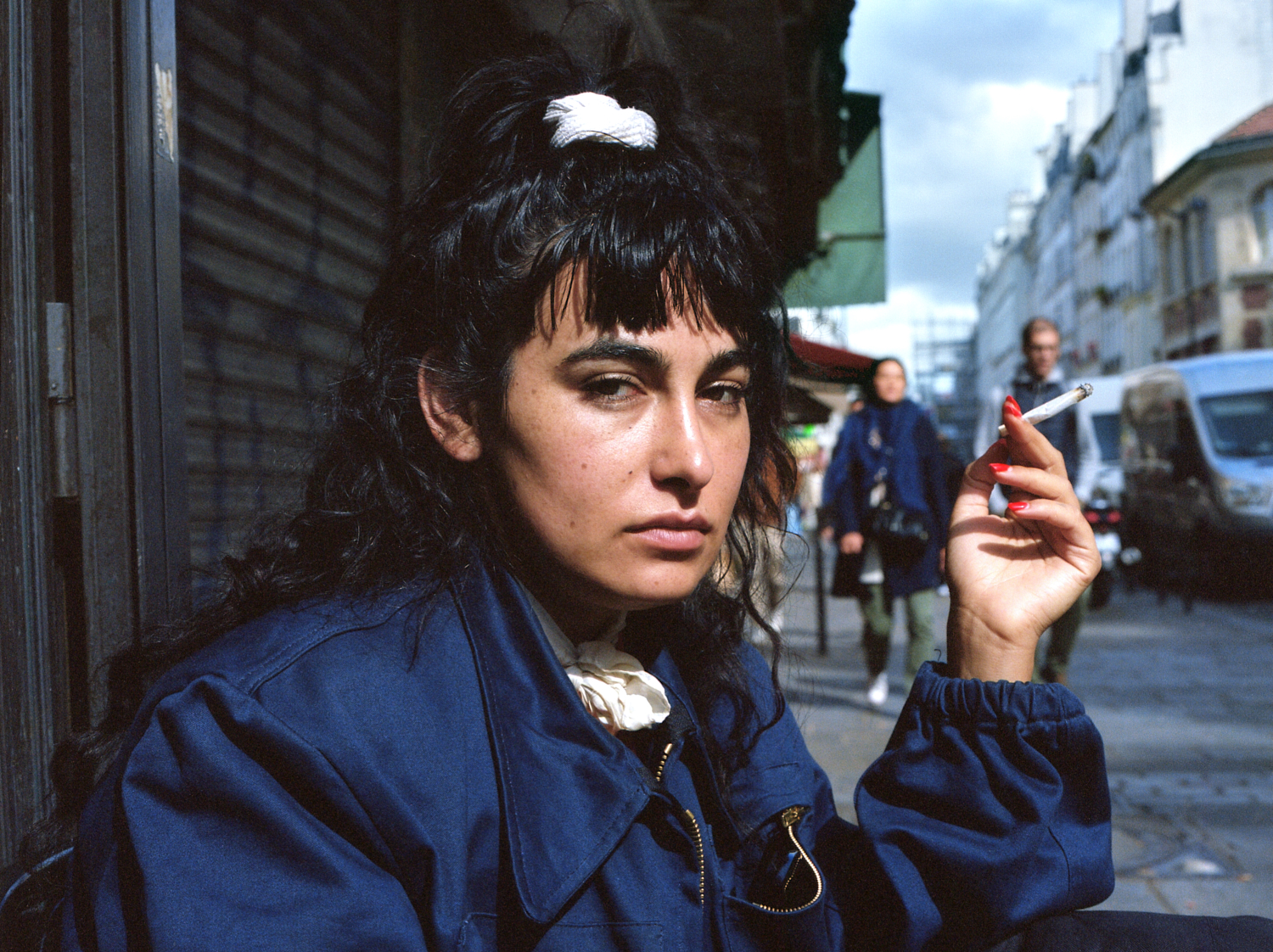
People are really emotionally attached to their hair. A lot of people see it as their identity. So, I think cutting someone’s hair becomes a huge responsibility in a way that doing makeup, or something on another part of the body, might not be.
Absolutely. I mean, it’s something you look in the mirror everyday and see. People say to me, ‘Oh, I don’t know why I care so much about my hair,’ and I’m like, ‘Uh, because you have to stare at it all day!’ It’s part of your face; it’s part of what you are wearing; it’s a part of how you want to represent who you are. So, when you get a bad haircut you feel misrepresented, and you feel hurt and ignored. Then when you get a really shitty haircut, it’s a violation because the hairdresser didn’t hear, or listen, to what you had to say. Trusting somebody with something that makes you who you are, and then you get something you don’t stand for? You just feel totally taken advantage of. I’ve had a lot of clients that have gone through chemo, and I’ve cut their hair when it’s growing back, or made wigs for them, or given them extensions until their hair grew out.
Also, depending where you’re from culturally, hair can be super emotional—that’s part of why I love to do it so much. I like talking to people and getting to know them, and it’s almost like this weird sort of therapy, doing someone’s hair. Even just touching someone’s head, I can feel their tension and their emotions. So, I feel like doing people’s hair is almost like helping them in a certain way. And on a superficial level, changing people’s idea of what looks good, or what’s cool, and helping them achieve what they want—it’s just another part of being heard and understood.
Let’s talk about that superficial element. Being in an industry like fashion, where they’re the ones dictating all of the things we’ve been talking about—like, what’s cool, or what’s in, or what’s beautiful—can, in a lot of ways be exactly that: shallow. So, for someone like you, who’s incredibly outspoken about your political beliefs, how do you make sure your ideals are being represented in what you do?
I mean, it’s definitely hard sometimes. There are times where I’m just trying to help and they don’t care about what I’m saying, and during those times I just think, ‘At least I am getting paid for this job.’ Because I want to murder myself after doing shit like that. But I try really hard to choose the things I want to do, and now, I can allow myself to be more selective. If it’s a commercial job, I don’t want to do hair for fun and have to work somewhere else. But you know, everyone needs to earn money to live. Still, there are some things I’ll just never say yes to—like, I’m never going to help some white chick braid her hair because she wants to look black. And if they want to fire me, so be it. I’ll work with someone who wants to work with me, and shares the same ideas.
With Instagram, people do kind of vibe out who you are, and people have decided not to work with me because of my political views. Straight up, people just said, ‘No way,’ because of the things I share online, and that’s totally fine. There are plenty of amazing people in the world doing good things, and those are the people I know I will end up working with.
That’s probably why you ended up working with a brand like Vaquera—because you’re both fighting for the same things through different mediums.
Right. Like, I’m probably never going to work with Dolce and Gabbana, but that’s fine. I don’t need to work with people like that. But what you said about being superficial—I struggle with that all the time. So many people say, ‘But your job is so superficial,’ and I’m like, ‘No, it’s really fucking not.’ Everything I looked at as a kid, in magazines and editorials, or any art films that inspired me in the way I dress and the way, I represent myself and what I want to do today. If nobody radical is working in these fields, then it’s just going to be a commercial shit show. So, it’s important to have people of all facets, and belief systems, and moral codes, to all work in different aspects of everything. It’s also something I just love doing.
What’s your favorite part?
There are two: I like that you really get to know someone in an hour and give them something that they are going to be able to look at every day and enjoy. Tbat’s really cool, and personal, and intimate. As for session work, I love making and creating a different world, and a total fantasy for a day or two, then destroying it and never doing it again. I can think for ages about what I want to do, and develop the idea just for the right moment, and then I’m so happy after I have executed it, I don’t have to look at it again, I don’t want to do it again, it’s finished, I did it, I’m happy, it’s dead now. Then I get to think about some new idea. I mean, I think all creative people are obsessive and anxious. I know I definitely am.
